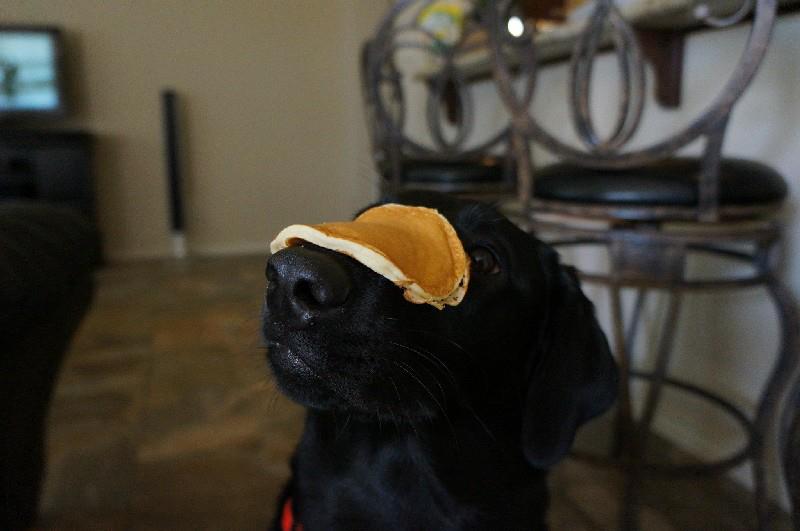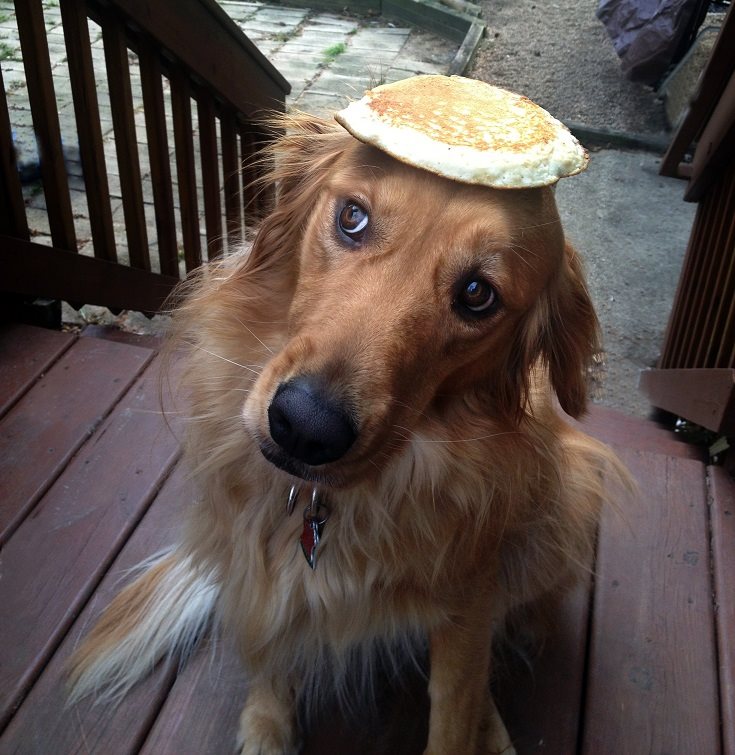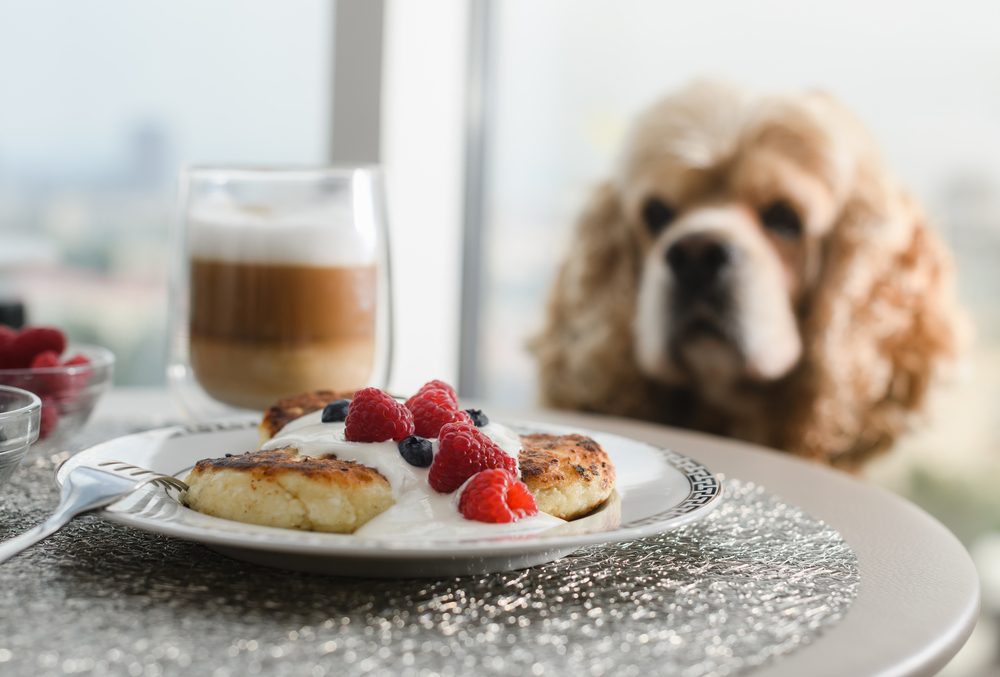In the 1870s, “flapjacks” became known as “pancakes” in America. Pancakes, a thicker, fluffier version of British pancakes and French crepes, became popular in America. Pancakes remain a frequent item on many American breakfast menus. Perhaps you, too, are a pancake enthusiast wondering if your dog would also enjoy them. But can dogs eat pancakes?
Yes, most dogs can eat pancakes, but it is not healthy for dogs to eat pancakes regularly. The ingredients in a pancake are unhealthy for dogs to consume over the long term. Moreover, do not feed pancakes to dogs with wheat allergies or dairy intolerances. Regular feeding of pancakes puts your furry friend at risk of developing obesity or other serious health problems.
This article reviews what happens to dogs who eat pancakes, the reasons pancakes can be harmful to doggies, and special ways to prepare pancakes for dogs’ safety. We’ll also review various ingredients and toppings that are safe to add to your pup’s pancake and those to avoid. But first, let’s figure out what happens to dogs who regularly eat pancakes.
What Happens If My Dog Eats Pancakes?

Dogs that eat plain pancakes occasionally and in moderate amounts rarely experience negative side effects or long-term consequences.
Pancakes are not safe for doggies with wheat allergies or lactose intolerance. Dogs with grain allergies may have irritated or red skin that they itch frequently. Doggies may also develop nausea, diarrhea, or vomiting.
Dogs with lactose intolerance may experience diarrhea, bloating, or general stomach upset after eating pancakes, which include milk.
Pancakes are not nutritious enough to feed to dogs often. Feeding your canine pancakes may eventually lead to health problems, including diabetes, high blood sugar, vomiting, pancreatitis, and excessive weight gain.
Are Pancakes Bad For Dogs?
Pancakes are not good for dogs if the pancakes contain toxic ingredients or if dogs eat pancakes too often or in too large an amount.
Pancakes do not have nutritional value for your canine pal. While there may not be an immediate negative effect on Fido after eating a few pancakes, eating pancakes on a regular basis can cause harm.
Some negative effects when feeding pancakes to canines are as follows:
Weight Gain
Pancakes are high in carbs, fat, and sugar. All these can cause your dog to gain weight or even develop obesity.
Sodium Toxicity
Eating several pancakes can cause a high sodium level in your doggie. For your pup, too much sodium can lead to sodium toxicity or salt poisoning, causing excessive vomiting.
Flour Allergy
Some dogs are allergic to certain grains like wheat. Identify the flour source in pancakes first. Do not feed your dog ingredients that they are allergic to.
Lactose Intolerance
Pancakes usually contain milk. Dogs with lactose intolerance can develop symptoms like vomiting, diarrhea, and bloating.
Are Pancakes Safe For Dogs?

If your dog is not allergic to grains or lactose intolerant, plain pancakes are typically safe for dogs. Do not include harmful ingredients such as chocolate chips or syrup with xylitol.
It doesn’t matter how much your canine friend loves this snack; never make pancakes part of your dog’s regular diet. Make pancakes an occasional treat to avoid negative health consequences.
Consult your vet before introducing new foods to your dog.
Can Dogs Eat Plain Pancakes?
Yes, dogs can eat plain pancakes in small quantities once in a while.
Plain pancakes should contain only flour, refined oil, eggs, and milk. Using only those ingredients keeps allergens and toxicity to a minimum. Even then, your dog should only eat plain pancakes once in a while since they are not nutritious.
How Many Pancakes Can A Dog Eat?
Do not give your large canine friend more than one pancake per serving. Small-sized dogs may safely eat a ¼ to ½ of one standard pancake.
If your dog is fairly inactive, be extra careful with the quantity you serve. If your furry friend won’t burn off the many calories that a regular-sized pancake contains, reduce the amount to only a few small pieces. But large dogs can eat one whole pancake if the pancake is plain and doesn’t include harmful ingredients.
Overall, the idea is to keep your dog’s carb, sugar, and fatty intake within safe limits.
What Can Dogs Have On Pancakes?
Dogs can have some healthy toppings with pancakes. Do not feed dogs chocolate chips or syrup with xylitol, which are both toxic to dogs.
Avoid toppings that increase the quantity of fat, carbs, and sugar in the pancake. Dog-friendly toppings include healthy fruits like carrots, apples, and bananas, which you can chop and serve in moderate quantities. Avoid spreading sugary sauces or jams on your doggie’s pancake.
Can Dogs Eat Pancakes With Maple Syrup?
Yes, dogs can eat pancakes with small amounts of natural maple syrup. Do not feed dogs syrup with xylitol, which is toxic to dogs.
Maple syrup even contains some essential nutrients for dogs, such as calcium, manganese, vitamins, and antioxidants. Do not feed pancakes or maple syrup to dogs regularly or in large amounts. They contain too much sugar and carbohydrates for your canine friend.
Again, pancakes may already contain lots of sugar, and adding maple syrup can spike your pup’s blood sugar. Excessive sugar in Fido’s diet can cause stomach upsets, inflammation, and increased activity of unhealthy bacteria in the gut of your furry friend.

Can Dogs Eat Cinnamon Pancakes?
As long as cinnamon is free from sugar and xylitol, it makes a great addition to your canine friend’s pancakes.
Cinnamon contains many essential nutrients for dogs: calcium, magnesium, iron, vitamins A, B1, B2, B3, B6, C, K, manganese, phosphorus, and more.
Cinnamon is also rich in antioxidants that defend your dog from neurological disorders. The spice’s anti-inflammatory properties can relieve joint pain and reduce swelling in your dog.
As with spices, do not be too generous when applying to your furry friend’s pancakes. A small amount goes a long way.
Can Dogs Eat Pancakes Without Syrup?
Yes, dogs can eat pancakes without syrup. It is better for doggies to eat pancakes plain.
Adding syrup increases the dangers to your dog’s health. While syrups without xylitol are not toxic to dogs, adding syrup to pancakes for dogs increases the sugar and caloric content. So eating pancakes without syrup is much healthier for dogs.
Can Dogs Have Pancakes With Baking Powder?
Do not feed your dog pancakes with baking powder because it could cause digestive distress in your dog.
Baking powder can react with the stomach acids of your canine and cause stomach bloating, seizures, and even spasms. Again, baking powder has little or no nutritional benefit to dogs, so you should totally avoid adding it to pancakes.

Can Dogs Eat Pancakes With Butter?
No, never add butter to pancakes for your dog.
Butter contains a high amount of unsaturated fats, which are detrimental to dogs’ health. These unwanted lipids can cause your dog to experience stomach upset. Also, butter causes your dog to gain weight rapidly.
Besides, studies reveal that your canine friend could be at risk of pancreatitis by eating high-fat diets such as butter. Don’t add butter to your dog’s pancake.
Can Dogs Eat Pancakes With Honey?
Honey is a natural sweetener, and you can certainly add it, in small amounts, to pancakes for dogs.
There are many benefits of honey. Some benefits include easing allergies, healing wounds, soothing kennel cough, and aiding digestion. Your dog can benefit from having a little honey on a pancake.
However, beware of adding too much honey to your dog’s pancake because it is high in natural sugar. Excess sugar can negatively affect your canine’s dentition and cause other health problems.
If your dog is diabetic, do not add honey to its pancake, as this may worsen its health condition.

Can Dogs Eat Pancakes With Sugar?
No, do not add sugar to a dog’s pancake. This is because sugar is not healthy for canines. Adding sugar to a dog’s pancake can lead to several health conditions.
First, your dog could suffer from stomach upset and a shift in the balance of the bacteria in your canine’s gut. The outcome could be bloat, indigestion, vomiting, and even diarrhea.
Also, too much sugar may cause undesired conditions, such as high blood sugar, obesity, inflammation of the pancreas, or pancreatitis.
Lastly, sugar can negatively affect the oral health of your furry friend.
Bacteria in your dog’s mouth flourish in the presence of sugar and produce acids. Consequently, enamel corrosion occurs, eventually causing cavities.
Can Dogs Eat Pancakes And Eggs?
Dogs can undoubtedly eat eggs with pancakes because eggs add nutritional value to the meal.
Making pancakes with eggs for your dog allows it to benefit from the many nutrients found in eggs. Eggs are high in proteins, fatty acids, and vitamins, which are essential for the all-around health of your canine friend.





